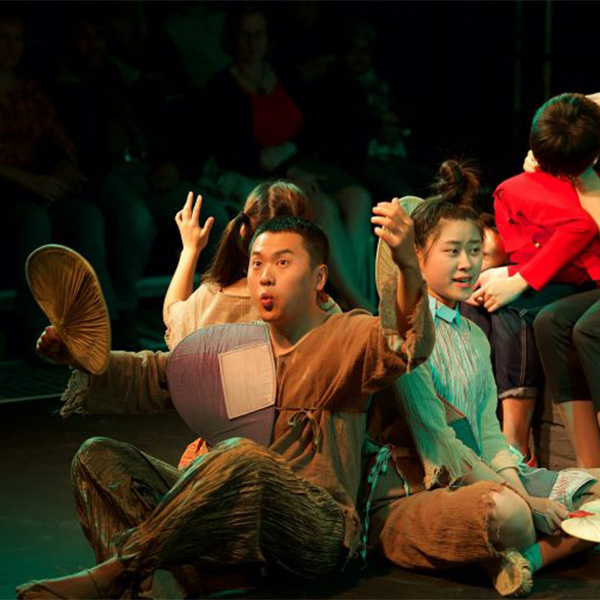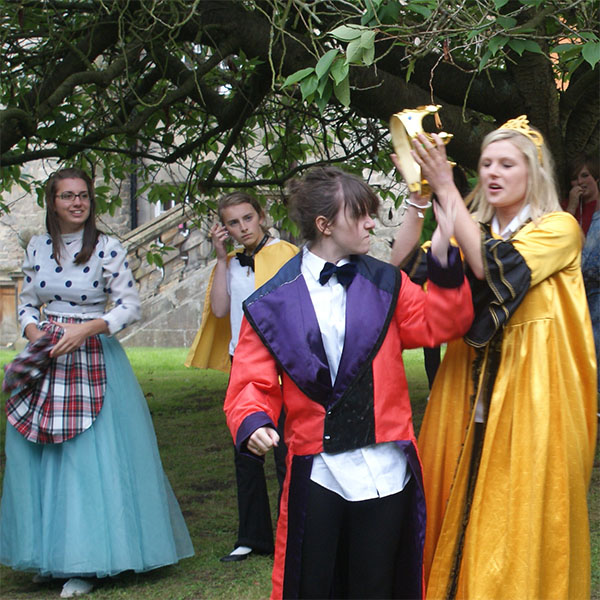As a specialist in blank verse, I was fortunate to be involved in an unusual academic and performance project organised by the University of Leeds to mark the 400th anniversary of the deaths of both Shakespeare and the Ming dynasty playwright Tang Xianzu. A new stage production was presented by two groups of academics and students preparing and rehearsing on different continents, with Beijing-based students from the University of International Business and Economics (UIBE) adapting A Midsummer Night’s Dream, while students from Leeds University reworked Tang’s Nanke-ji (A Dream Under the Southern Bough).
The adaptations were performed at both Universities before appearing at the 2016 Leeds Intercultural Festival and the Edinburgh Festival Fringe, followed by a tour of China including Beijing, Shanghai, and Tang’s hometown Fuzhou during the Tang Xianzu Memorial Festival.
Ruru Li, Professor of Theatre Studies at the University of Leeds, suggested I assist Jun Li, director of UIBE’s A Midsummer Night’s Dream, in aspects of their script. Jun, a passionate advocate of Shakespeare’s style, wanted to remain faithful to the poetic nature of the work even though this aspect of the adaptation might prove challenging to non-native English speakers.
Jun’s script – which he wrote with co-adaptor Bingying Wang – clearly took inspiration from parts of the original text that echoed aspects of Chinese culture, especially in a chorus-like assembly of three Spirits representing different attitudes towards love: Sense, Sensibility and Moderation. Jun pointed out that as ‘moderation’ is a quality highly valued in China, this Spirit was portrayed as especially Chinese.
Jun especially wanted the Spirits to speak in iambic pentameter, in order to distinguish their voices from the non-magical characters, who would also speak in verse at times of heightened emotion. We had an idea of what should be said: it was a case of converting the dialogue into blank verse. This is how I usually work on iambic pentameter, firstly by creating an overall plan of the meaning and effect and then working on the poetry.
Contemporary concerns were included, with social media mentioned to demonstrate potential for communications and miscommunication between the characters. With a modern work in a classic style, referring to aspects of contemporary life makes new metaphors and allusions possible. This is an advantage of poetic dialogue, as comparisons are naturally drawn between one thing and another, drawing in complex ideas and making them human. The language was kept as clear and contemporary as possible, so as not to over-complicate with very specific Elizabethan terms and references.
This project involved many people through study, practical theatrical work, and cross-collaboration. My own small part in this production revitalised my writing practice with new ideas. As Ruru commented when working on the project, “It is a genuine intercultural practice, both thought-provoking and a great pleasure for everyone involved.” It is also a testament to the enduring qualities of the classic form that these playwrights, four hundred years after their deaths, can still have their work produced and adapted in such a modern way.
Reviving Renaissance
Reviving Renaissance
Political Drama by Jessica Winston, Professor of English, Idaho State University Near the beginning of Lucy Nordberg’s play, King Arthur announces a plan to change the government from a monarchy to democracy. He explains: I can ensureMy choice of heir is just, but...

